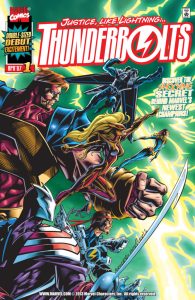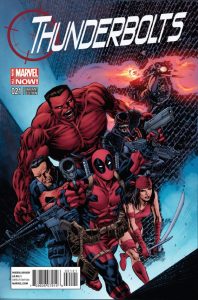LET’S TALK ETHICS IN COMIC BOOKS Y’ALL!! Who’s HYPED? Who’s SUPER PUMPED? Who’s ready to get HELLA STOKED about some WILDLY PRETENTIOUS ETHICAL DISCUSSION?!?!

Nobody, of course. Talking ethics isn’t interesting, but the Thunderbolts sure are. So let’s ponder this: Are the Thunderbolts good guys or bad guys?
First, let’s pause for a few sentence primer on the Thunderbolts. They are a Marvel comics superhero team that consists of reformed super-villains. Well, mostly reformed, that is.
Originally written in 1997 by Kurt Busiek and Mark Bagley, the Thunderbolts first appeared in Incredible Hulk #449. They were billed as a superhero team to replace the Avengers who were thought dead after the events of the gawd-awful 1996 “Onslaught” crossover. But the big final splash page reveal was that the Thunderbolts were actually the Masters of Evil in disguise. Dun dun dun.
In the nearly two decades hence, Marvel has published hundreds of issues of the Thunderbolts. There have been reboots, relaunches, crossovers, tie-ins, and every other marketing trick Marvel could toss at readers. Throughout it all, the Thunderbolts have proven to be popular and enduring.
Some of the notable members of the Thunderbolts have included Baron Zemo, Moonstone, Bullseye, Venom, Ghost, Satana, Mister Hyde, Winter Soldier, and Punisher. We’ve published articles on the members of the Thunderbolts: The Core Thunderbolts, The Best Thunderbolts, and a list that imagined if Luke Cage Was in Charge of a Thunderbolts Sorority House.
Marvel’s Thunderbolts: Are they heroes or not?
Sometimes the members of the Thunderbolts were members by choice, other times they were members by force. But the common theme was that the Thunderbolts appear to work for the good of the public. What are the ethics of that? If they are villains pressed into service by force, does that make them good guys?
Maybe. Maybe not. If each Thunderbolt would take a look into Michael Jackson’s Man in the Mirror, they might not like the reflection staring back at them. After all, these characters have continued to be written as deeply, deeply flawed individuals throughout their storied history.
Moonstone, for example, has nearly always been a member of the team and she remains as despicably manipulative as ever. Sure, she’s largely kept in line, but the leopard has in no way changed her spots.

Yet other Thunderbolts sincerely do seem like they have reformed somewhat. Some characters continue to have an occasional misstep, but overall you could say that they now are on the side of angels. Maybe practicing good behavior has made them a little closer to perfect.
Regardless, the Thunderbolts have a certain privilege that they gain simply by being a member of the team. Since the American public believes they are on the side of good, the Thunderbolts can take advantage of the privilege that the benefit of the doubt grants. This benefit of the doubt potentially allows them to get away with wicked deeds should they wish.
We see this in real life among politicians, Wall Street executives, CEOs, and the like. Nearly every one of us have been aghast at the hypocrisy or downright no good we’ve seen among public figures, yet they continue to go about their business unabated and without real consequences. Much like the Thunderbolts, they can be villains hiding in plain sight, in other words.
In public, the Thunderbolts appear to be good, but the reality is that they often are not. This begs the question: Is it necessary to BE good, or is it enough to APPEAR to be good? If you could get away with being bad while appearing to be good, would you do it? And what do we think of people who do get away with it?
Ye old philosopher, Plato, wrote his masterpiece The Republic in 380 BC. In the book Thrasymachus argues a grim and depressing thought, which is that we are only good when we think we will get a little something out of it. His argument was that humanity wouldn’t be good simply to be good, they’d only be good if they could gain some advantage from it.
Plato was playing the Devil’s advocate of course. Plato believed that humanity had a spark of genuine goodness in it. And comics have illustrated this goodness at times. Captain America has exceptional strength that he could use to take whatever he wants by force, yet he chooses to be a superhero, serving the public good instead of satisfying his own desires. That’s why Cap is the best.
The Thunderbolts? Not so much. They travel the path of Thrasymachus, willing to do good only because it benefits them. That’s not a hero in my book. Make mine Captain America, Marvel.
But it sure as heck doesn’t make the Thunderbolts any less fun to read. The team drama alone is enough to make the comic a page turner. Talking ethics of comics books typically wouldn’t be exciting if you ground the comics into glitter dust and shot them out of a confetti cannon onto a zooming Segway ridden by crack addict kung-fu wildebeests.
Ethics and philosophy is utterly devoid of any inherent excitement. War, murder, Kardashians, dumpster fires, and long, vicious political campaigns are what’s exciting. But for folks who’ve suffered through those aforementioned things, let’s take a moment to soak up the luxury of being able to spare a few moments to ponder thinky thoughts about some comic book (anti) heroes.

